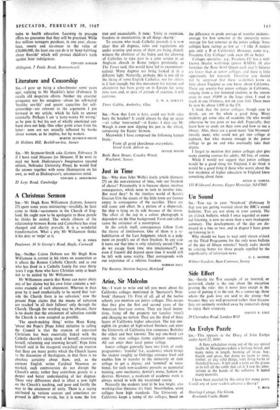Sm.—Neither Canon Dobson nor Mr Hugh Ross Williamson is correct
in his views on ecumenism as it affects the Roman Catholic Church; and as one who has lived in a Catholic family for over thirty years I urge those who have Christian unity at heart not to be misled by Mr Williamson.
Mr Williamson asserts that Rome can never abate any of her claims but his own letter contains a wel- come example of such abatement. Whereas in days gone by it used emphatically to be stated that 'out- side the Church there is no salvation,' now the present Pope claims that the means of salvation are reached 'in all their fullness' only through the Church. Though the wording may be obscure, there is no doubt that the attainment of salvation outside the Church is now accepted as possible.
'The epoch-making thing,' writes Hans Kung, 'about the Pope's [Pope John] initiative in calling the Council is that the reunion of separated Christians has been essentially linked with the Catholic church's taking stock of herself, examining herself, reforming and renewing herself.' Pope John himself said in his inaugural encyclical on reunion that there are many points which the Church leaves to the discussion of theologians, in that there is no absolute certainty about them, and, as the eminent English writer Cardinal Newman re- marked, such controversies do not disrupt the Church's unity; rather they contribute greatly to a deeper and better understanding of her dogmas. These very differences shed in effect a new light on the Church's teaching, and pave and fortify the way to the attainment of unity. There is a saying attributed to various sources and sometimes ex- pressed in different words, but it is none the less
true and unassailable. It runs: 'Unity in essentials, freedom in uncertainties, in all things charity.'
To anyone who reads Catholic journals it is now clear that all dogmas, rules and regulations are under scrutiny and many of them are being abated; witness the abolition of the Index and the allowing of Catholics to take part in a joint service in an Anglican church in Rome (where previously, as The Times said, this would have led to excommuni- cation). Many dogmas are being looked at in a different light. Naturally, perhaps, this is not all to the liking of some English Catholics. nor for others is it fast enough, but this movement for reform and abatement has been going on in Europe for some time now and, in spite of periods of reaction, it will continue.


































 Previous page
Previous page